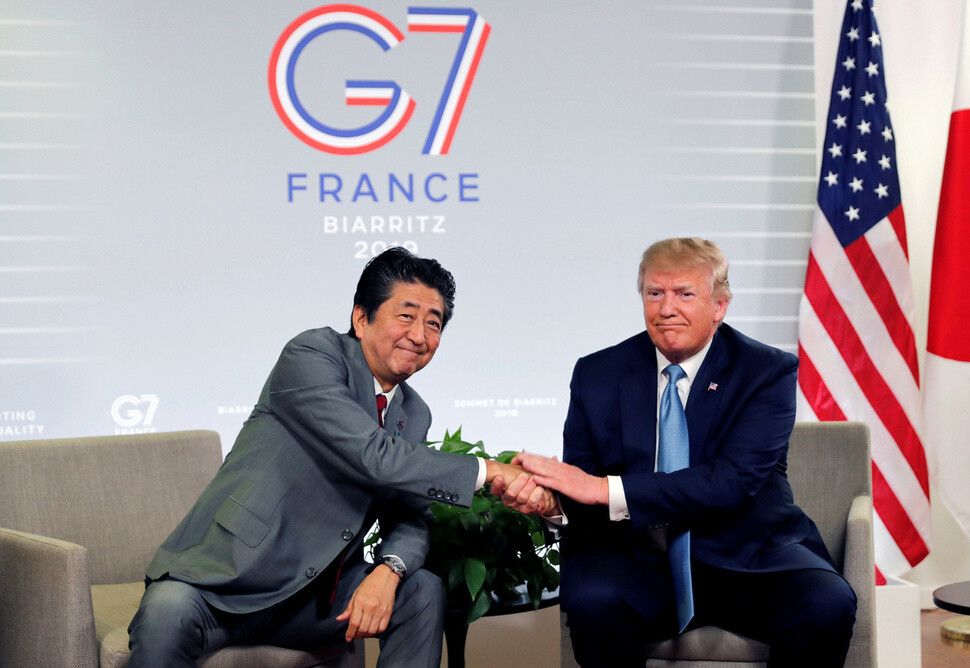hankyoreh
Links to other country sites 다른 나라 사이트 링크
Trump gives muted response on S. Korea’s withdrawal from GSOMIA

US president’s muted response in contrast to Washington’s blatant dissatisfaction
When asked about the South Korean government’s decision to terminate an intelligence-sharing agreement with Japan, US President Donald Trump said, “We’re going to see what happens.”
Though Trump’s response was more muted than stern comments from the US State Department, concerns remain that the Trump administration will crank up pressure on Seoul over its decision to scrap the General Security of Military Information Agreement (GSOMIA).
While Trump was speaking to reporters on the evening of Aug. 23 before leaving the White House to attend the G7 summit in France, one reporter asked if he was worried about South Korea’s withdrawal from GSOMIA. “Well, we’re going to see what happens,” Trump said.
“President Moon [is] also a very good friend of mine. And we’ll see what happens with South Korea.”
When asked about Japan shortly before that, Trump had said, “I’m going to see Prime Minster Abe. I look forward to it. He’s a great gentleman. He’s a great friend of mine.” Trump’s remark that Moon is a “very good friend” came immediately afterward.
This was the first time that Trump had spoken publicly about South Korea’s decision to leave GSOMIA. On previous occasions, Trump had remarked that South Korea and Japan have frequent disputes and that the US would like its allies to get along, but this time, he kept his remarks brief. That contrasts with the dissatisfaction the US government expressed with unusual candor the previous day: US Secretary of State Mike Pompeo voiced his disappointment, the State Department described a severe misunderstanding by the Moon administration, and the Defense Department spoke of disappointment and strong concerns. For now, Trump has refrained from aggravating the situation by openly condoning or condemning either side in the dispute.
Even so, the US government’s attitude toward Seoul’s decision to scrap GSOMIA remains very chilly. Regarding GSOMIA as a key element in its Indo-Pacific strategy, aimed at containing China, North Korea, and Russia, and as a symbol of trilateral cooperation with South Korea and Japan, the US had asked Seoul not to end the agreement. The US’ annoyance was made evident when a senior official in Washington flatly contradicted the Blue House’s initial claim to the press that the US had been sympathetic to its decision.
Some experts expect that Seoul will pay for its decision in other areas. Larry Niksch, a researcher at the Institute for Corean-American Studies (sic), told the Voice of America that Moon’s withdrawal from the comfort women agreement and the actions he has taken subsequently represent defiance not only of Japan but also of the US.
The termination of GSOMIA, Niksch added, could give Trump an excuse to increase pressure in other areas. In particular, it could weaken South Korea’s bargaining power in the two countries’ negotiations over the 11th Special Measures Agreement (SMA) of their defense cost-sharing agreement, which are slated to begin in September. This past March, Seoul agreed to contribute 1.04 trillion won (US$853.7 million) to the cost of stationing US troops on the peninsula, which was up 8.2% from the previous year, and the US is asking for another big increase for next year’s contribution.
By Hwang Joon-bum, Washington correspondent
Please direct comments or questions to [english@hani.co.kr]

Editorial・opinion
![[Guest essay] Amending the Constitution is Yoon’s key to leaving office in public’s good graces [Guest essay] Amending the Constitution is Yoon’s key to leaving office in public’s good graces](https://flexible.img.hani.co.kr/flexible/normal/500/300/imgdb/original/2024/0416/8917132552387962.jpg) [Guest essay] Amending the Constitution is Yoon’s key to leaving office in public’s good graces
[Guest essay] Amending the Constitution is Yoon’s key to leaving office in public’s good graces![[Editorial] 10 years on, lessons of Sewol tragedy must never be forgotten [Editorial] 10 years on, lessons of Sewol tragedy must never be forgotten](https://flexible.img.hani.co.kr/flexible/normal/500/300/imgdb/original/2024/0416/8317132536568958.jpg) [Editorial] 10 years on, lessons of Sewol tragedy must never be forgotten
[Editorial] 10 years on, lessons of Sewol tragedy must never be forgotten- [Column] A death blow to Korea’s prosecutor politics
- [Correspondent’s column] The US and the end of Japanese pacifism
- [Guest essay] How Korea turned its trainee doctors into monsters
- [Guest essay] As someone who helped forge Seoul-Moscow ties, their status today troubles me
- [Editorial] Koreans sent a loud and clear message to Yoon
- [Column] In Korea’s midterm elections, it’s time for accountability
- [Guest essay] At only 26, I’ve seen 4 wars in my home of Gaza
- [Column] Syngman Rhee’s bloody legacy in Jeju
Most viewed articles
- 1[Guest essay] Amending the Constitution is Yoon’s key to leaving office in public’s good graces
- 2[Editorial] 10 years on, lessons of Sewol tragedy must never be forgotten
- 3Faith in the power of memory: Why these teens carry yellow ribbons for Sewol
- 4Final search of Sewol hull complete, with 5 victims still missing
- 5[Guest essay] How Korea turned its trainee doctors into monsters
- 6How Samsung’s promises of cutting-edge tech won US semiconductor grants on par with TSMC
- 7Korea ranks among 10 countries going backward on coal power, report shows
- 8Pres. Park an accomplice in ordering resignation of CJ Group vice chairman
- 9[News analysis] Watershed augmentation of US-Japan alliance to put Korea’s diplomacy to the test
- 10K-pop a major contributor to boom in physical album sales worldwide, says IFPI analyst